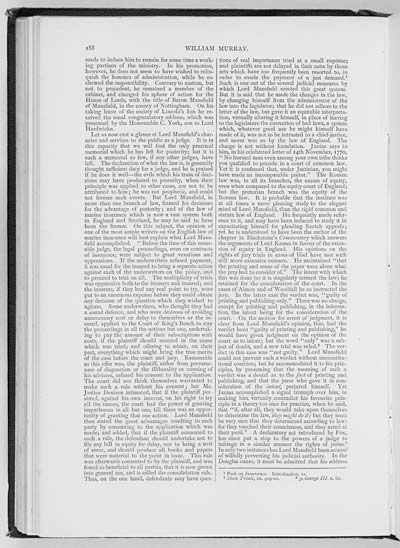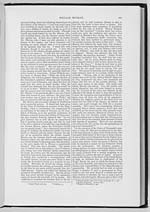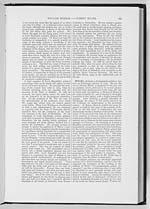188
made to induce him to remain for some time a work-
ing partisan of the ministry. In his promotion,
however, he does not seem to have wished to relin-
quish the honours of administration, while he es-
chewed the responsibility. Contrary to custom, but
not to precedent, he remained a member of the
cabinet, and changed his sphere of action for the
House of Lords, with the title of Baron Mansfield
of Mansfield, in the county of Nottingham. On his
taking leave of the society of Lincoln's Inn he re-
ceived the usual congratulatory address, which was
presented by the Honourable C. York, son to Lord
Hardwicke.
Let us now cast a glance at Lord Mansfield's char-
acter and services to the public as a judge. It is in
this capacity that we will find the only practical
memorial which he has left for posterity; but it is
such a memorial as few, if any other judges, have
left. The declaration of what the law is, is generally
thought sufficient duty for a judge, and he is praised
if he does it well�the evils which his train of deci-
sions may have produced to posterity, when their
principle was applied to other cases, are not to be
attributed to him; he was not prophetic, and could
not foresee such events. But Lord Mansfield, in
more than one branch of law, framed his decisions
for the advantage of posterity; and of the law of
marine insurance which is now a vast system both
in England and Scotland, he may be said to have
been the framer. On this subject, the opinion of
one of the most ample writers on the English law of
marine insurance will best explain what Lord Mans-
field accomplished. " Before the time of this vener-
able judge, the legal proceedings, even on contracts
of insurance, were subject to great vexations and
oppressions. If the underwriters refused payment,
it was usual for the insured to bring a separate action
against each of the underwriters on the policy, and
to proceed to trial on all. The multiplicity of trials
was oppressive both to the insurers and insured; and
the insurers, if they had any real point to try, were
put to an enormous expense before they could obtain
any decision of the question which they wished to
agitate. Some underwriters, who thought they had
a sound defence, and who were desirous of avoiding
unnecessary cost or delay to themselves or the in-
sured, applied to the Court of King's Bench to stay
the proceedings in all the actions but one, undertak-
ing to pay the amount of their subscriptions with
costs, if the plaintiff should succeed in the cause
which was tried; and offering to admit, on their
part, everything which might bring the true merits
of the case before the court and jury. Reasonable
as this offer was, the plaintiff, either from perverse-
ness of disposition or the illiberality or cunning of
his advisers, refused his consent to the application.
The court did not think themselves warranted to
make such a rule without his consent; but Mr.
Justice Denison intimated, that if the plaintiff per-
sisted, against his own interest, on his right to try
all the causes, the court had the power of granting
imparlances in all but one, till there was an oppor-
tunity of granting that one action. Lord Mansfield
then stated the great advantages resulting to each
party by consenting to the application which was
made; and added, that if the plaintiff consented to
such a rule, the defendant should undertake not to
file any bill in equity for delay, nor to bring a writ
of error, and should produce all books and papers
that were material to the point in issue. This rule
was afterwards consented to by the plaintiff, and was
found so beneficial to all parties, that it is now grown
into general use, and is called the consolidation rule.
Thus, on the one hand, defendants may have ques-
tions of real importance tried at a small expense;
and plaintiffs are not delayed in their suits by those
arts which have too frequently been resorted to, in
order to evade the payment of a just demand.1
Such is one out of the several judicial measures by
which Lord Mansfield erected this great system.
But it is said that he made the changes in the law,
by changing himself from the administrator of the
law into the legislator; that he did not adhere to the
letter of the law, but gave it an equitable interpreta-
tion, virtually altering it himself, in place of leaving
to the legislature the correction of bad laws, a system
which, whatever good use he might himself have
made of it, was not to be intrusted to a chief-justice,
and never was so by the law of England. The
charge is not without foundation. Junius says to
him, in his celebrated letter of 14th November, 1770,
" No learned man even among your own tribe thinks
you qualified to preside in a court of common law.
Yet it is confessed that, under Justinian, you might
have made an incomparable pretor." The Roman
law was, in all its branches, the excess of equity,
even when compared to the equity court of England;
but the pretorian branch was the equity of the
Roman law. It is probable that the institute was
at all times a more pleasing study to the elegant
mind of Lord Mansfield, than the rigid common and
statute law of England. He frequently made refer-
ence to it, and may have been induced to study it in
capacitating himself for pleading Scotch appeals;
yet he is understood to have been the author of the
chapter in Blackstone's Commentary which answers
the arguments of Lord Kames in favour of the exten-
sion of equity in England. His opinions on the
rights of jury trials in cases of libel have met with
still more extensive censure. He maintained "that
the printing and sense of the paper were alone what
the jury had to consider of." The intent with which
this was done (as it is singularly termed the law) he
retained for the consideration of the court. In the
cases of Almon and of Woodfall he so instructed the
jury. In the latter case the verdict was, "guilty of
printing and publishing only." There was no charge,
except for printing and publishing, in the informa-
tion, the intent being for the consideration of the
court. On the motion for arrest of judgment, it is
clear from Lord Mansfield's opinion, that, had the
verdict been "guilty of printing and publishing," he
would have given judgment on the opinion of the
court as to intent; but the word "only" was a sub-
ject of doubt, and a new trial was ruled.2 The ver-
dict in this case was "not guilty." Lord Mansfield
could not prevent such a verdict without unconstitu-
tional coercion; but he accommodated it to his prin-
ciples, by presuming that the meaning of such a
verdict was a denial as to the fact of printing and
publishing, and that the juror who gave it in con-
sideration of the intent, perjured himself. Yet
Junius accomplished a signal triumph over him, in
making him virtually contradict his favourite prin-
ciple in a theory too nice for practice, when he said,
that "if, after all, they would take upon themselves
to determine the law, they might do it; but they must
be very sure that they determined according to law:
for they touched their consciences, and they acted at
their peril." A declaratory act introduced by Fox,
has since put a stop to the powers of a judge to
infringe in a similar manner the rights of juries.3
In only two instances has Lord Mansfield been accused
of wilfully perverting his judicial authority. In the
Douglas cause, it must be admitted that his address
1 Park on Insurance. Introduction, 12.
2 State Trials, xx. 919-21. 3 32 George III. C. 60.

![]() Universal Viewer |
Universal Viewer | ![]() Mirador |
Large image | Transcription
Mirador |
Large image | Transcription
![]()

